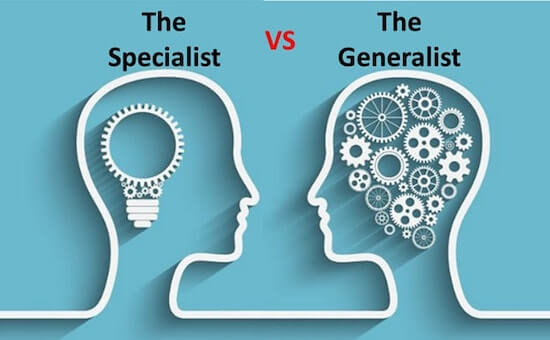
“Jack of all trades, master of none”
This commonly used phrase emphasises the importance of learning specialist skills. When Adam Smith created the foundation of modern Economics, he talked of the “division of labour”, a concept then radically accelerated by the industrial age where we learned to focus on specific skills and pay other specialists to do the things we don’t know or don’t do. This phrase echos that approach. However, I recently learned the full version of the phrase above, being:
“Jack of all trades, master of none, but oftentimes better than master of one”
When asked about my own skill set, for many years now I have often said “I am a specialist generalist“, as I am someone with the good fortune to have had a radically high amount of depth and breadth of experience, so I can and have been effective in leading and managing many different types of businesses in many countries and cultures. I even wrote prior blogs about this idea here and here.
As I note on my LinkedIn profile, I am:
A “recovering Chartered Accountant”, my experience is Global, having worked in 38+ countries. During the first two decades of my career, I was involved “hands-on” in buying, building, restructuring and selling 29 companies, as small as $100K and others as large as and beyond $100 million. For over a decade now, though, I have committed to and focussed on coaching and supporting leaders.
Often having specialist skills are truly valuable, and at the same time having a focus on “lateral learning” can also turn you into a “specialist generalist”.
If you or someone you know is at the stage of looking at University then career choices, I have always highly recommended the Chartered Accountancy qualification as a wonderful foundation for any future career in business. When I qualified in 1989, and to this day, around half of all newly qualified accountants stay in public practice, but the other half move out into a massive variety of other businesses and organisations. Yes, many of those people remain in accountancy and finance-related roles through their career, but many also take that qualification, build experience upon it, and then move out into broader management and leadership roles, as I did by my mid to late 20s and ever since.
Are you a Jack of all Trades ?
PS I’m also really good at “pub quizzes”, though when in the UK have a blind spot for UK culture questions from the 1990s. Hey, Cayman didn’t have much in the way of radio stations then, and the internet wasn’t a great option until the late 90s!
